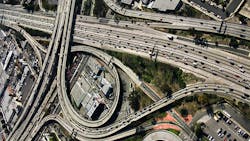Will US Infrastructure be the Real Winner of the Election?
Repairing the nation's crumbling infrastructure is front and center for both presidential candidates.
Hillary Clinton has proposed a five-year, $265 billion plan that would be funded through business tax reform using a national infrastructure bank that would leverage funds resulting in up to $500 billion in federally supported investment. The money would go toward ports, airports, roads and waterways, as well as investments in "smart cities" with infrastructure that's part of the Internet of Things.
Donald Trump has said that he will "at least double" Clinton's spending and will fund it with new debt in the form of "infrastructure bonds" and an infrastructure fund.
"The one thing we know about infrastructure spending is it's going to happen," economist Peter Morici of the University of Maryland told CNN. "It's one of the few things Hillary promises to do within the first 90 days.
Now Trump is saying he wants to do it."
There are already plans in place to shore up the country's infrastructure as President Obama signed a five-year, $305 billion bill to repair the country's aging infrastructure last year. But the jury is still out as to whether the bill will achieve its goal.
The need is urgent as more than 63,000 bridges throughout the country are said to be in need of major repairs, and at least 32% of roads are in poor condition.
And demand is increasing, as the Transportation Department estimates the volume of freight traffic will increase 45% over the next 30 years.
The American Society of Civil Engineers recently gave America a D+ rating in terms of infrastructure, citing dilapidated roadways, insufficient waterways and "a pressing need for modernization." The group estimates $3.6 trillion would need to be invested into U.S. infrastructure by 2020 just to raise the country's support systems to acceptable levels.
A new poll by the Association of Equipment Manufacturers (AEM) found that half of registered voters believe the infrastructure has gotten worse over the past five years, and a majority of voters believe roads and bridges are in "extreme" need of repair.
"Americans across the political spectrum understand the dire state of U.S. infrastructure and believe that the federal government should do more to improve it," says Dennis Slater, president of AEM. "Voters recognize that increased federal funding for assets such as roads, bridges and inland waterways will have a positive impact on the economy, and they are looking to the federal government to repair and modernize."
Among the poll's key findings:
- Half (49%) of those surveyed feel that the federal government is primarily responsible for funding repairs to the nation's infrastructure.
- Seven out of every 10 respondents say increasing federal funding for infrastructure will have a positive impact on the economy.
- More than eight out of every 10 respondents consider water infrastructure (86%), solar-powered homes (83%) and smart infrastructure (82%) as the top three important innovations for the future of infrastructure.
- Voters across the political spectrum think that the federal government should do more to improve the nation's overall infrastructure, with 68% of Republicans, 70% of Independents and 76% of Democrats sharing this sentiment.
Whatever the final number is on how much is spent on infrastructure, the U.S. economy will benefit as this type of spending has a multiplier benefit. According to Heidi Crebo-Rediker, CEO of the International Capital Strategies and senior fellow at the Council on Foreign Relations, a $1.3 billion investment returns $2 billion in growth, nearly doubling the investment. That kind of ROI should be an easy sell in this election year.
